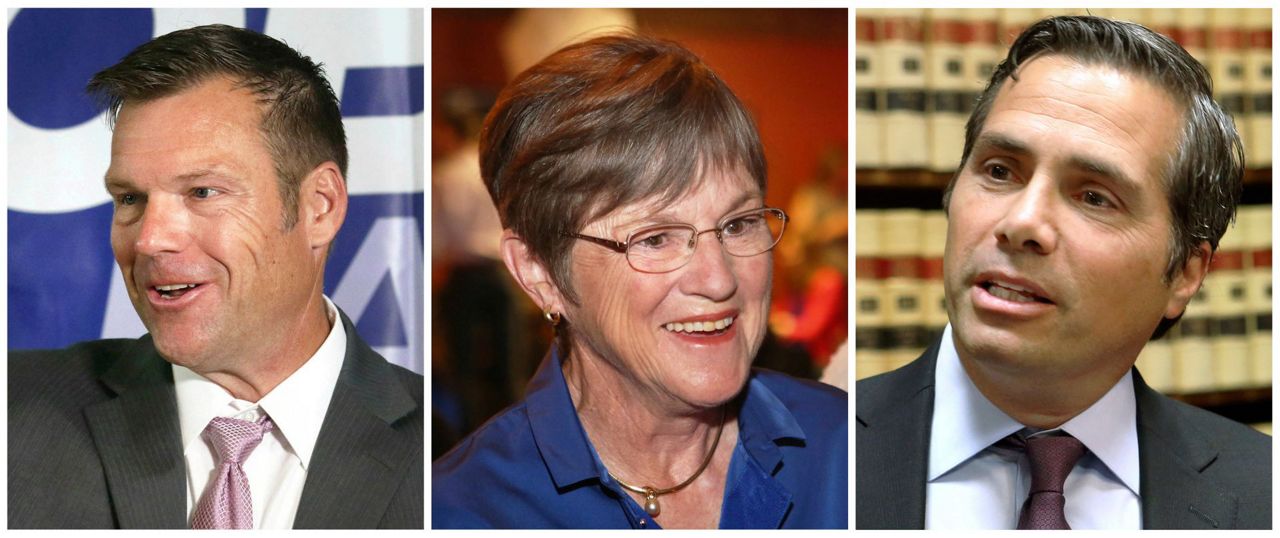TOPEKA, Kan. (AP) — Democrats in Kansas who have had to sit on the political sidelines for the better part of a decade are hoping for a blue wave on Election Day that could help them break the Republican grip on power and are optimistic about their chances in several races, including the one for governor.
Kansas is a virtual lock for the GOP nominee in presidential races. President Donald Trump won the state two years ago by nearly 21 percentage points, and the last Democratic presidential candidate to carry it was Lyndon Johnson in 1964. Kansas last elected a Democrat to the U.S. Senate in 1932, and Republicans are close to a 2-to-1 advantage among registered voters.
Yet a purple streak runs through the state because of decades of infighting within the dominant Republican Party. In the past 50 years, the state has had five Republican and five Democratic governors.
Chris Reeves, a Democratic National Committee member from the Kansas City area, said 2018 was "a year that was really set up for us," with energy high and many Democratic candidates outpacing GOP foes in fundraising.
"Let's say everything goes wrong," Reeves said. "I think what it causes us to do is to say, 'You know what? We needed a lot more legwork from the spring on, in registering new voters.'"
The marquee race for governor between conservative Republican Kris Kobach and Democrat Laura Kelly was a toss-up in the campaign's final weekend. Kelly is wooing GOP moderates who are put off by Kobach's hardline stances on issues such as immigration, while Kobach expects his conservative base to turn out to counter enthusiasm on the left.
While Trump won the state handily, he narrowly lost the Kansas City-area congressional district of GOP Rep. Kevin Yoder, who is now in danger of losing his seat because suburban voters have turned against the president.
Democrats also hope to flip the open seat in a neighboring eastern Kansas district where Republicans are suffering from their perennial problem of internal dissension. A political novice emerged from a crowded Republican primary and is struggling to unite the party behind him.
The state GOP's goal is to wash out any purple to make Kansas like other states that haven't elected a Democratic governor in more than 20 years, such as Idaho, South Dakota, Texas or Utah. Kansas Republicans started their latest streak with a clean sweep of statewide and congressional races in 2010, riding a wave of tea party opposition to President Barack Obama.
In 1994, in a GOP-wave year nationally, Republicans swept all of those races except one, state insurance commissioner. After winning that down-ballot race, Democrat Kathleen Sebelius built a political profile that allowed her to win two terms as governor.
State GOP Chairman Kelly Arnold said that if Republicans manage another sweep this year, "We have basically eliminated the Democrat bench."
Kobach, the Kansas secretary of state, is Trump's closest political ally in the state. He advocates tough state policies against immigration and promises to shrink state government so that Kansas can return to cutting taxes.
He's battling the ill-feelings left over from former Republican Gov. Sam Brownback's experiment in cutting income taxes in 2012-13 and ensuing budget problems that prompted even some national Republicans to label the effort a failure. Legislators reversed most of the tax cuts in 2017, and Kelly, a veteran state senator from Topeka, argues that Kobach's election would end a nascent fiscal recovery.
Independent candidate Greg Orman, a Kansas City area businessman, trails far behind Kelly and Kobach but could be a spoiler helping Kobach.
Kansas House Minority Leader Jim Ward, a Wichita Democrat, argues that if Kobach is elected, his conservative politics will make him a foil that helps Democrats recruit candidates. And, with the excitement this year, "That energy doesn't go away."
During a recent get-out-the-vote rally in Topeka, Kobach described the governor's race as "super-close."
"This is a situation where every phone call you make counts," he told fellow Republicans. "Every text message you send counts."
The race for the eastern Kansas open seat also is extremely close. It features Democrat Paul Davis, who narrowly lost to Brownback in a run for governor four years ago, and Republican Steve Watkins, an ex-Army officer and government contractor. They're running to replace retiring Republican Rep. Lynn Jenkins.
Watkins, a political newcomer, has been caught inflating parts of his biography , but Trump carried the GOP-leaning district by 17 percentage points, and the GOP is hungry to keep the seat.
Democrats are more confident of picking up the Kansas City-area seat, where Yoder is struggling to win a fifth term. Democrat Sharice Davids has gained national attention because she's LGBT and Native American.
Patrick Miller, a University of Kansas political scientist, said losing all three big races would be a big blow to Democrats' morale. But he discounts the idea of a long-term political exile for them because, "two years, four years, from now, it's a different political context."
"There are states in this country, sometimes they go decades without electing a governor of a certain party, and that party that keeps losing, they nominate awful candidates," Miller said. "But then the right electoral circumstances happen, and, bam!"
___
Follow John Hanna on Twitter: https://twitter.com/apjdhanna
___
For AP's complete coverage of the U.S. midterm elections: http://apne.ws/APPolitics
Copyright 2018 The Associated Press. All rights reserved. This material may not be published, broadcast, rewritten or redistributed.






